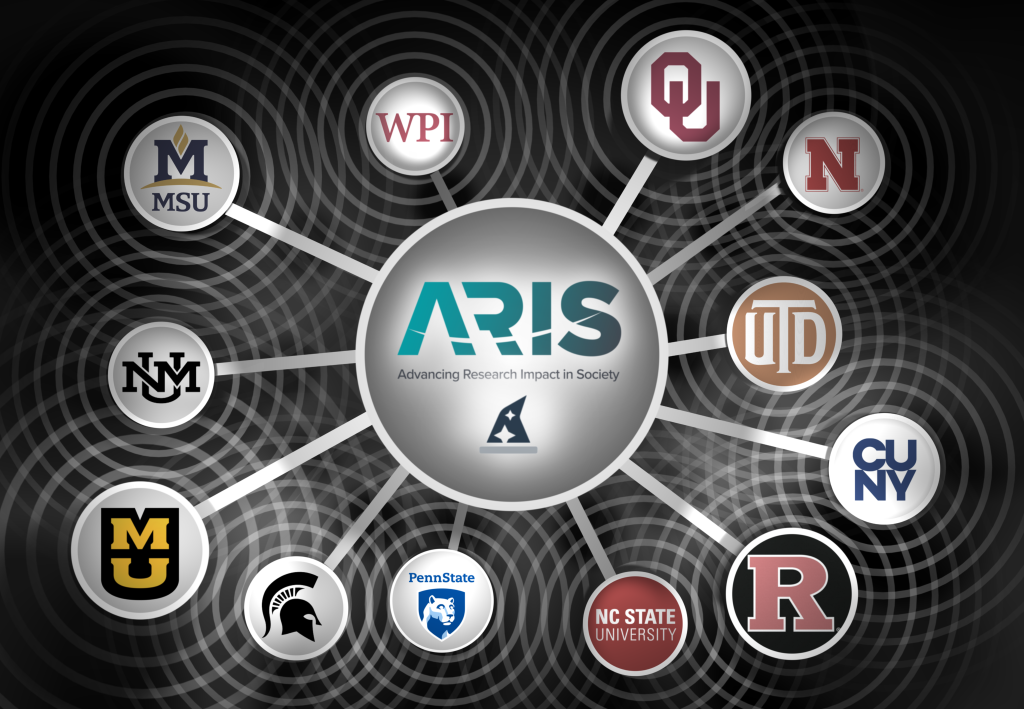Dan Moser, March 2, 2025
R&I staff help review broader impacts toolkit
Nebraska’s expertise in developing the societal impacts of its research gave it a role in reviewing broader impacts tools designed by the national Center for Advancing Research Impact in Society (ARIS).
Aimed at helping researchers and research support staff develop impact plans that fulfill the broader impacts criterion set by the National Science Foundation, the ARIS Broader Impacts (BI) Toolkit was reviewed by 12 universities, including the University of Nebraska-Lincoln, in a special issue of the Journal of Community Engagement and Scholarship.
“We were all charged with implementing and evaluating the BI Toolkit in different institutional settings,” said Jocelyn Bosley, research impact coordinator, who led UNL’s contribution to the study. “We figured out how it made sense to implement it in our context and then what kind of research questions we wanted to pose and what we wanted to learn about the Toolkit.”
The Nebraska team, which included members of the Office of Research and Innovation’s research development group, investigated the Toolkit in the context of R&I’s CAREER Club—an award-winning program to support and guide early-career faculty in developing competitive proposals for the NSF Faculty Early Career Development Program (CAREER).
The CAREER program places a unique emphasis on integrating research and education. This integration can take many forms, however. “It’s going to depend on your field of study and your values and goals and objectives,” Bosley said. “Given that it’s so amorphous, it’s hard to give concrete guidance for faculty to say what that looks like.” In addition, many early-career faculty lack experience in developing strong educational plans that align with their research.
To help fill that gap, the UNL R&I team looked to the ARIS Broader Impacts Rubric, part of the BI Toolkit. By evaluating the integration of CAREER proposals and correlating it with the Rubric scores for these proposals, the UNL study team uncovered specific strategies by which early-career faculty and research administration can leverage the BI Toolkit to strengthen research-education integration in CAREER proposals.
“A lot of times when we talk about demonstrating impact, there has been this sort of academic exercise of saying, how do we justify the use of taxpayer dollars to support this research? How is it benefiting communities? How is it benefiting the rest of society? And I think up to this point, a lot of faculty and maybe even some research development people thought of it as an abstract good.”
It’s become increasingly important that faculty think beyond such abstractions and make a strong case for how their research benefits society, Bosley said.
Interviews the study team conducted with CAREER Club participants show that Nebraska researchers have embraced this approach, which is especially important in a political environment where demonstrating real-world impact can be critical to proposals’ success.
“I also think that it makes it a lot more rewarding for researchers because nobody wants to just do their work in isolation in a lab and not have anybody pay attention to it. Nor do they want just their fellow scientists to look at it,” she added. “They want to have some kind of impact.”
Though the Toolkit’s broader impacts language mirrors that used by NSF, the digital resources are useful for proposals to other agencies as well, Bosley said. They are designed to help principal investigators think about addressing societal needs and enhancing societal benefits. Additional resources in the Toolkit include a guiding principles document, a planning checklist and the interactive Broader Impacts Wizard.
Director of proposal development Tisha Gilreath Mullen, partnerships and programs lead Matthew Dwyer, proposal development coordinator Amanda Bohlin, proposal development specialist Jaclyn Tan, and associate vice chancellor for research, capacity, and competitiveness Nathan Meier are co-authors on the study.
The original news release focused on the special edition of the Journal of Community Engagement and Scholarship appeared in the Rutgers Newsroom, a product of the New Jersey Agricultural Experiment Station and School of Environmental and Biological Sciences Office of Public Outreach and Communication.






